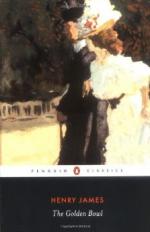something in them; whereby he stared there, beautiful
and sombre, at what she was at present providing him
with. There was something of his own in his mind,
to which, she was sure, he referred everything for
a measure and a meaning; he had never let go of it,
from the evening, weeks before, when, in her room,
after his encounter with the Bloomsbury cup, she had
planted it there by flinging it at him, on the question
of her father’s view of him, her determined
“Find out for yourself!” She had been aware,
during the months, that he had been trying to find
out, and had been seeking, above all, to avoid the
appearance of any evasions of such a form of knowledge
as might reach him, with violence or with a penetration
more insidious, from any other source. Nothing,
however, had reached him; nothing he could at all
conveniently reckon with had disengaged itself for
him even from the announcement, sufficiently sudden,
of the final secession of their companions. Charlotte
was in pain, Charlotte was in torment, but he himself
had given her reason enough for that; and, in respect
to the rest of the whole matter of her obligation
to follow her husband, that personage and she, Maggie,
had so shuffled away every link between consequence
and cause, that the intention remained, like some
famous poetic line in a dead language, subject to
varieties of interpretation. What renewed the
obscurity was her strange image of their common offer
to him, her father’s and her own, of an opportunity
to separate from Mrs. Verver with the due amount of
form—and all the more that he was, in so
pathetic a way, unable to treat himself to a quarrel
with it on the score of taste. Taste, in him,
as a touchstone, was now all at sea; for who could
say but that one of her fifty ideas, or perhaps forty-nine
of them, wouldn’t be, exactly, that taste by
itself, the taste he had always conformed to, had no
importance whatever? If meanwhile, at all events,
he felt her as serious, this made the greater reason
for her profiting by it as she perhaps might never
be able to profit again. She was invoking that
reflection at the very moment he brought out, in reply
to her last words, a remark which, though perfectly
relevant and perfectly just, affected her at first
as a high oddity. “They’re doing
the wisest thing, you know. For if they were ever
to go—!” And he looked down at her over
his cigar.
If they were ever to go, in short, it was high time,
with her father’s age, Charlotte’s need
of initiation, and the general magnitude of the job
of their getting settled and seasoned, their learning
to “live into” their queer future—it
was high time that they should take up their courage.
This was eminent sense, but it didn’t arrest
the Princess, who, the next moment, had found a form
for her challenge. “But shan’t you
then so much as miss her a little? She’s
wonderful and beautiful, and I feel somehow as if
she were dying. Not really, not physically,”
Maggie went on— “she’s so far,
naturally, splendid as she is, from having done with
life. But dying for us—for you and
me; and making us feel it by the very fact of there
being so much of her left.”




